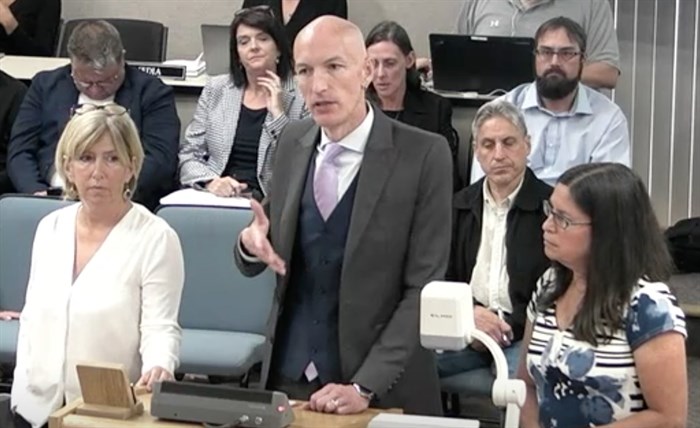
Interior Health chief medical officer Dr. Trevor Corneil, centre, and Dr. Karin Goodison, right, take questions from Kamloops city council on Tuesday, Aug. 14, 2018, regarding the city's opioid crisis.
Image Credit: City of Kamloops
August 15, 2018 - 12:49 PM
KAMLOOPS - Interior Health's lack of support for needle buyback programs was a hot topic of debate at Kamloops city council yesterday.
Interior Health chief medical health officer Dr. Trevor Corneil took questions from city council at its meeting yesterday, Aug. 14, in an effort to explain why it is hesitant to support needle buyback programs in an effort to reduce the number of improperly disposed of needles.
Caroline King and Dennis Giesbrecht started a needle buyback program earlier this year in Kamloops to help reduce the number of improperly disposed of needles in the community.
Coun. Ray Dhaliwal says the group has collected thousands improperly disposed of needles in the North Kamloops area.
"I know from our own city here, the people that have started the needle buyback program have recovered over 8,000 needles alone," Dhaliwal says. "It's working and I can't see any reason why we can't expand."
Corneil says he understands the good intentions of the people who run the programs, but Interior Health can't support putting a value on a needle.
"Needle buyback programs are not effective and in fact, they encourage another illicit market in the background," Corneil says. "People begin to bring in needles from other places so they can get their nickel or their dime."
He says that money could be used better elsewhere.
"I think an important piece to look at is what is the outcome you're measuring when it comes to harm reduction, is your outcome actually the number of needles you collect back? That's an important piece but that's not the outcome," he says. "The outcome is to decrease transmission of disease and decrease the risk of overdose and access to treatment."
Jessica Bridgman with Interior Health says last year there were approximately 257,000 needles ordered for the Kamloops local health area which also covers Chase, Lillooet, Lytton, Clearwater, Ashcroft and Barriere. She says that's a very broad region so they don't have the number specifically for Kamloops.
Medical health officer Dr. Karin Goodison, who was also part of the Interior Health delegation, says they don't count the needles that are recovered.
"What we do have a sense of is the needles that are picked up by community organizations that are improperly disposed and based on the information that we have of improperly disposed of needles, it appears that less than one per cent of those distributed needles are improperly disposed of," Goodison says.
Corniel admits one per cent is still a large number.
"Our primary efforts are to increase access to treatment to those people who have an opiate disorder and decrease the stigma associated with it," he says.
For more coverage opioid crises in the Interior go here.
To contact a reporter for this story, email Karen Edwards or call (250) 819-3723 or email the editor. You can also submit photos, videos or news tips to the newsroom and be entered to win a monthly prize draw.
We welcome your comments and opinions on our stories but play nice. We won't censor or delete comments unless they contain off-topic statements or links, unnecessary vulgarity, false facts, spam or obviously fake profiles. If you have any concerns about what you see in comments, email the editor in the link above.
News from © iNFOnews, 2018